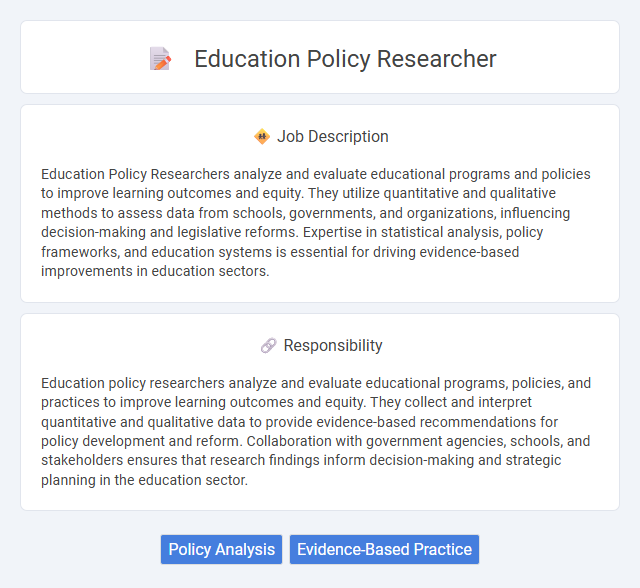
Education Policy Researchers analyze and evaluate educational programs and policies to improve learning outcomes and equity. They utilize quantitative and qualitative methods to assess data from schools, governments, and organizations, influencing decision-making and legislative reforms. Expertise in statistical analysis, policy frameworks, and education systems is essential for driving evidence-based improvements in education sectors.
Individuals with strong analytical skills and a passion for improving educational systems are likely suitable for an Education Policy Researcher role. Those comfortable working with data, conducting rigorous research, and interpreting complex policy documents may find this job fulfilling. Candidates who thrive in collaborative environments and have a deep interest in social equity and educational reform could have a higher probability of success in this position.
Qualification
Education policy researchers typically hold advanced degrees such as a Master's or Ph.D. in education, public policy, sociology, or related fields, demonstrating strong analytical and research skills. Proficiency in quantitative and qualitative research methods, data analysis software like SPSS or Stata, and experience with policy evaluation are essential. Effective communication abilities and a deep understanding of educational systems and legislation further qualify candidates for this role.
Responsibility
Education policy researchers analyze and evaluate educational programs, policies, and practices to improve learning outcomes and equity. They collect and interpret quantitative and qualitative data to provide evidence-based recommendations for policy development and reform. Collaboration with government agencies, schools, and stakeholders ensures that research findings inform decision-making and strategic planning in the education sector.
Benefit
Benefits of working as an education policy researcher likely include access to opportunities for influencing education reform and contributing to evidence-based decision making. This role probably offers professional growth through collaboration with educators, policymakers, and academic institutions. It is also probable that the position provides intellectual stimulation by engaging with complex data and societal issues.
Challenge
Education policy researchers likely face the challenge of navigating complex and evolving educational systems while balancing diverse stakeholder perspectives. They may encounter difficulties in accessing reliable data and ensuring its accuracy for informed decision-making. The probability of addressing policy impact effectively hinges on continuous adaptation to changing political and social contexts.
Career Advancement
Education policy researchers analyze data and develop strategies to improve educational systems, driving evidence-based reforms that influence local, state, and national policies. Mastery in quantitative and qualitative research methods enhances the ability to secure advanced roles such as senior analyst or policy director. Expanding expertise in data analytics, grant writing, and stakeholder engagement significantly accelerates career advancement in this competitive field.
Key Terms
Policy Analysis
Education Policy Researchers specializing in policy analysis evaluate the effectiveness and impact of educational policies through data-driven methodologies and qualitative assessments. They synthesize research findings to inform evidence-based decision-making, shaping policies that address equity, funding, and curriculum standards in schools. Proficient in statistical tools and legislative frameworks, these researchers collaborate with stakeholders to develop comprehensive recommendations for improving educational outcomes.
Evidence-Based Practice
Education Policy Researchers specializing in Evidence-Based Practice analyze data and empirical studies to develop effective educational strategies and policies. They evaluate the impact of existing programs using quantitative and qualitative methods to ensure decisions are grounded in reliable evidence. Their work supports policymakers in implementing interventions that improve student outcomes and educational equity.
 kuljobs.com
kuljobs.com